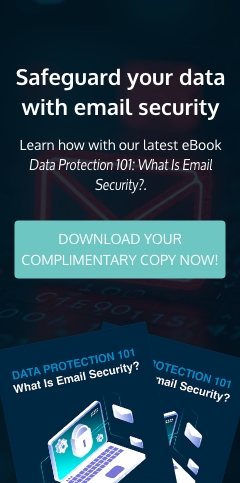Email is an effective communication tool that businesses have been using for many years. Not only does it allow organizations to send and receive messages quickly, but it also allows them to reach out to potential customers.
However, the use of email introduces organizations to a nasty problem: spam or junk mail. According to Kaspersky, spam accounts for an average of 46.56% of global mail traffic, implying that half of all messages users receive are junk.
Spam typically contains unwanted or unsolicited advertising or promotional materials. However, they can also be used to launch malware and phishing attacks against your organization. To combat these threats, it’s important to implement effective email security solutions such as a spam filter.
A spam filter is an application that uses various techniques to prevent unwanted email from landing in a user’s inbox
What is a spam filter?
A spam filter is an application that uses various techniques to prevent unwanted email from landing in a user’s inbox. Messages that are flagged as unsolicited or dangerous are typically sent to the spam or junk folder, or are entirely blocked.
What are the different types of spam filters?
The following spam filters use different methods to identify spam:
1. Content filters
A content filter examines the text in an email’s header and body to determine if the message is spam. This filter exploits the predictability of the content of spam messages, which typically have the following objectives:
- To promote sexually explicit material
- To offer deals
- To tap into human emotions and desires
Content filters typically flags an email as spam if it:
- Uses words that are commonly used in spam, such as “limited time,” “dear ma’am/sir,” “incredible deal,” and “special offer”
- Has very little text and contains only images
- Contains attachments that are typically used in malware attacks (i.e., .exe, .vbs, .scr, .js files)
- Includes links to blacklisted websites
Bulk commercial emails, or those that do not have a clear method for unsubscribing and a valid physical business address, are also flagged as spam.
2. Blacklist/Blocklist filters
Blacklist/Blocklist filters block emails from senders that have been included on a list of spammers. This list is collated by server administrators from user reports and internet service and email providers. Common email blacklist providers include Microsoft, Barracuda, Spamhaus, and Proofpoint. Blacklist/Blocklist filters are updated regularly to include spammers’ newly created email addresses.
Businesses can also use their own blacklist/blocklist filters. For instance, these filters can be used to block recruiters seeking to poach a company's employees. Businesses can also use the filters to block emails that could disrupt employees' productivity.
3. Language filters
These filters can block any emails that are not in the recipient’s native language. Similar filters can also be implemented for emails that come from outside the recipient’s country. However, if a colleague or customer from another country reaches out to the user, the language filter could flag their email as spam. In these instances, the sender must tell the recipient to check their spam folder.
4. Rule-based filters
These filters allow an IT administrator to set specific rules that apply to all incoming emails. For instance, they can set the filter to redirect all emails from certain senders or those containing certain phrases to the spam folder.
5. Bayesian filters
Unlike the aforementioned spam filters that are based on fixed rules, Bayesian filters examine the content of the emails a user marks as spam and then set rules accordingly. In the future, incoming emails that possess similar features as those that have been blocked will be automatically flagged as spam.
Need help choosing the right spam filter for your business? NetQuest can help. With our Email & Spam Protection service, we will not just protect your business from all email cyberthreats, but we will also make it easy to access your critical messages. To see if your business will benefit from our services, download our FREE eBook today.


